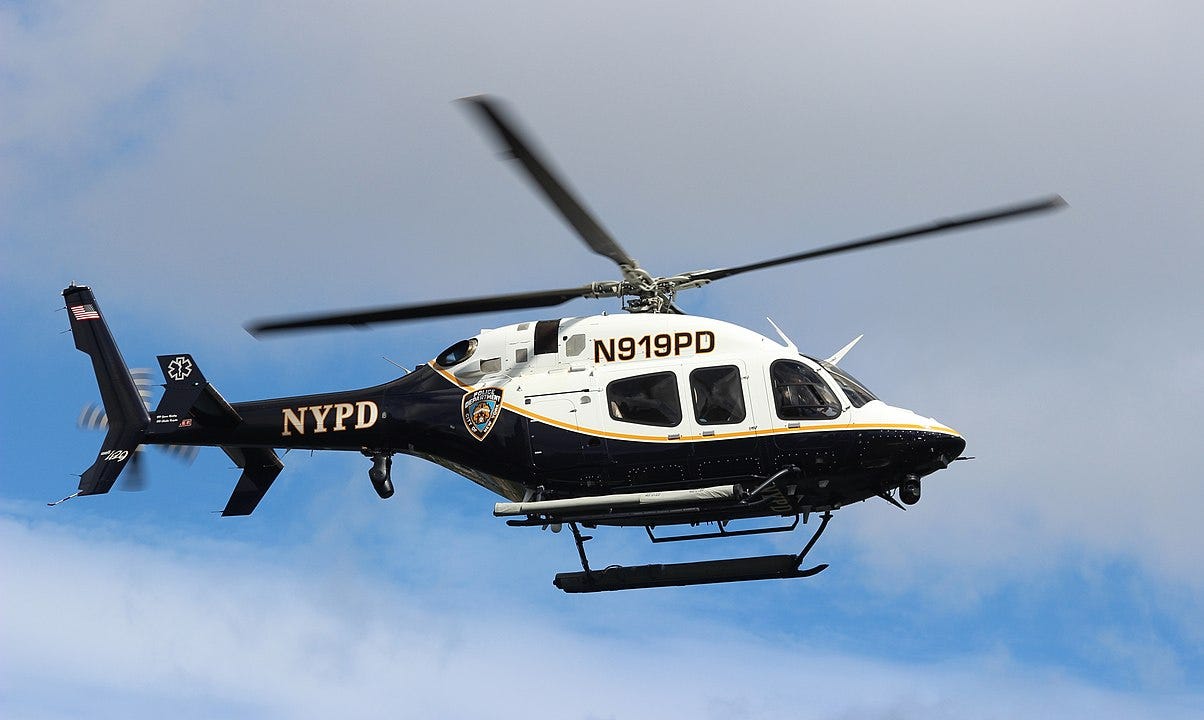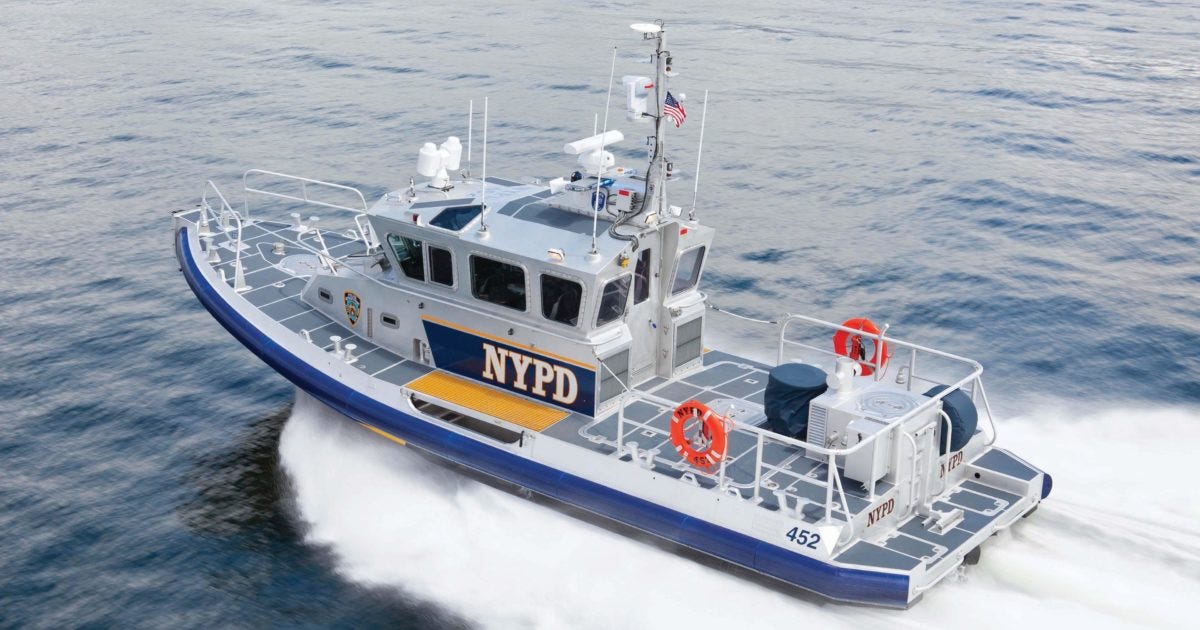If men were angels…
…no police would be necessary.
Bell 429 of the New York Police Department Aviation Unit
Men, however, are decidedly not angels.
Being a police officer is an often thankless task.
And, outside of major metropolitan cities and certain heavily populated States, police are paid fairly poorly. It is exceedingly doubtful that many of us would be willing to work in law enforcement for the paltry pay that the vast majority of officers receive.
Comparatively speaking, elected government officials are paid far too much in salary and perks, if you like, for the truly minor amount of work they do relative to government employees at large.
The primary duty that police officers are, or rather should be, entrusted with is dealing with violent crime. While the mere presence of the police does not in and of itself deter serious criminal activity, the awareness of police being fully out and about should and often does give the criminal element pause. Yet, the clearance rate, or the rate at which majors crimes are solved, so to speak, in the United States consistently hovers around fifty percent. Which roughly translates to half of all violent crimes committed in America going unsolved on a yearly basis.
There are many reasons for this. But, the one deserving the most attention is that the police in the United States are tasked with doing far too much. They are more often than not tasked with being social workers, mental health professionals, medics, baby-deliverers, traffic agents, general dispute-mediators, along with a whole host of business that one would not associate with police work in other developed countries. In addition, they’re asked to solve crimes ranging from arms-trading to zero-tolerance narcotics dealing. To say that police are overwhelmed would be an understatement.
Looking at the issue from the perspective of a workload dominated by non-quality of life matters, it can be seen clearly why nearly half of violent or major crimes go unsolved and criminals unpunished.
It is nearly a truism that America is or has become a very punitive society. For even the most minor offences society often seeks to exact a pound of flesh. This is especially true in the realm of illegal drug use. America incarcerates a far higher amount of it’s population, percentage-wise and in absolute terms, than practically any other nation on earth. The overwhelming majority of these individuals being adjudicated guilty of non-violent drug crimes. In addition to the aforementioned, there are several other reasons for this. The primary one being financial. Drug fines often generate significant revenue not only for law enforcement entities but for the State itself. In addition, the growth of the private prison industry, with some contracts requiring guaranteed levels of occupancy, creates a powerful but also perverse incentive to put people in jail.
A minor prescriptive to address this absurdity is to start providing police departments with the necessary salaries and funding to engage in what I earlier contended is their signal role. Dealing with serious and violent crime. Police officers cannot and should not be used as revenue agents of the State by having them deal with truly piddling matters. Personal use drug violations, minor traffic infractions, noise complaints, et al, should be dealt with people outside the sphere of police work and/or professionals in those fields working for the State. Now, certainly, these arguments have been made before and seem simple on the surface. However, what is often elided from the discussion is that taxes need to be levied to pay for the matter. And paying taxes, is something Americans in general are loathe to do. People, should however, be cognizant of the fact that every choice comes with a cost and at the most basic level taxes are the price paid for civilized society. Combined with everything stated up to this point a matter that needs some addressing is the increasingly violent nature, particularly over the last forty years, of American society in general.
This cannot alone be blamed on the coarsening of political discourse over the last few years. It must be looked at as part and parcel of the aggressive nature and tendencies not only on the part of our government in world affairs but in the day-to-day interactions of Americans as a whole.
It has been said that if your country solves every problem it sees in the world with violence then do not be surprised if that peculiar propensity bleeds down in to society at large. America as a nation has violent tendencies and this attitude has pervaded American society as a whole.
There is a view in certain quarters of American society, incorrect as it were, that holds an almost unlimited view of ‘freedom’ in the United States. This, of course, would be at odds with the sentiments of ‘Freedom under Law’ expressed at Runnymede. The birthplace of democracy. Stemming partly from the hyper-individualism embedded in American society, these, ultimately fantastical, ideas of freedom have, particularly in light of recent world events, led to the untenable idea of being able to do whatever one wants whenever one wants. Clearly, this would run against the more reasonable view that freedom is not the freedom to do what one wants to do, but the freedom to do what one ought to do.
Fabulist notions of liberty and freedom in the Uniteds States have led, in some of the more paranoid alleys of the societal soul, to individuals arming themselves beyond all reason and purpose. The mainly imagined rough and tumble, rugged-individualism of American society has led to rightful concerns with, for example, the nonsensical idea of disarming law enforcement officers. London, is often used as an example, of a situation where police can be unarmed in a major metropolis. The police there do not carry guns and outside of specialized firearms units, UK police carry mainly non-lethal weapons. But, they also carry the power of suasion which is a dominant feature amongst a generally more genteel populace.
But, to expect Police Officers in the US to, in an unarmed manner, mix with a, loaded, so to speak, society, is akin to asking scuba divers to descend to the depths with a just a straw for life-giving air.
As a quiet, if you like, response to the idea of unarmed police, many officers I have spoken with say that they will not even consider making other than the most egregious traffic-stop violations for fear that an armed individual may decide to take the law in to their own hands. Or rather, fight a summons by means other than in a courtroom.
In the broader debate of how police interact with the public, there is one thing that has no place, and in fact, should disqualify its proponents from the discussion. That is the fanciful notion of “defunding the police”. It is always curious to hear this prescription raised from oft-thought serious quarters. What would such an action look like? Who would step in to handle the main role of the police, in solving violent crime? Reasonableness would suggest that this is merely heat-of-the-moment sloganeering. But no. Some people truly adhere to this absurd notion.
The militarization of the police is pointed to by some as an integral part of why policing is perceived as it is in the US. However, the militarization of police forces in the United States did not occur in a societal vacuum. It’s beginnings can be partly traced to the mid-nineties after the collapse of the Soviet Union. Instead of somehow or other disposing of excess military equipment to take advantage of the peace dividend, the US government decided to allow police departments to acquire some of it at low or no cost.
It should be noted, however, that this circumstance began almost concomitantly with pushes in America to loosen gun control laws. While police forces were not specifically responding to increased arming of the public by acquiring surplus military equipment, as it were, these two events took place at much the same time.
There are certain prescriptions which one might look to to adjust the manner in which society views law enforcement.
Firstly, the law might be more properly thought of as an expression of societal morals, as opposed to holy writ come down from on high.
Secondly, it is important to note where police come from. They don’t fall out of the sky. They come from American homes, families, schools, and churches. They are products of the very society we seek to blame. If people are going to criticize law enforcement they must at the same time criticize themselves.
It is all too easy for some people, particularly those who cast stones from afar, to look askance at the men and women who do the difficult work that society asks of them.
I have no interest in casting aspersions against those who are tasked with protecting us and themselves from the predations of some of our fellow citizens. My interest is in pointing out the absurdity, ridiculousness, and useless nature of mindless sloganeering, empty platitudes, and performative politics in discussions about our society.
I was born and raised in New York City, and grew up in NYC public housing. And, our neighbors were all manner of people from different countries, backgrounds, and ethnicities. Some of our friends and neighbors were New York City Police Officers. While I am, of course biased, The Police Department of the City of New York represented the most safe, sure, and certain representation of the finest New York City had to offer. As a very young boy making his way around my little area of the City I knew that police officers where not only friends but could always be looked to for safety and security. They knew me, they knew the neighborhood, they were from the neighborhood. I always felt that no ill could befall me if the NYPD Blue were around. These feelings have stayed with me all through my life through all my travels. Some might say this is rank sentiment, I say no. It is heartfelt recollection.
“People sleep peaceably in their beds at night only because rough men stand ready to do violence on their behalf.”
― George Orwell



